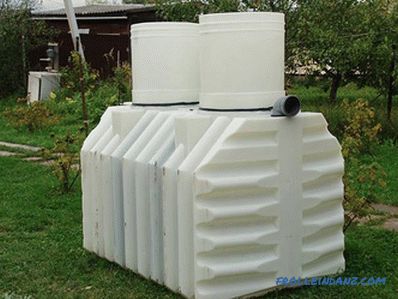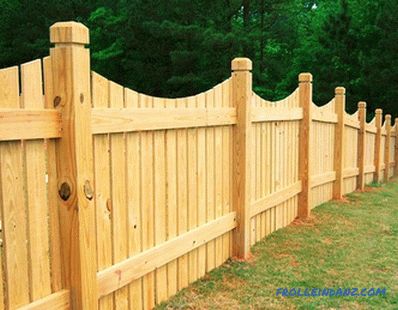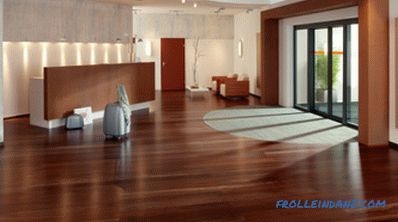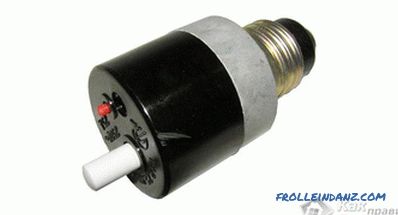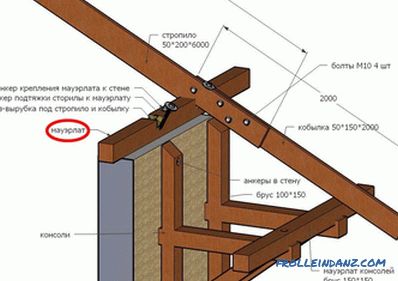When repairing an apartment or office, all major work is often done after the ceiling has been finished. The main task of this process is to level the surface. This is also the most difficult part of the work. Alignment is necessary in any case, regardless of the method of covering the ceiling, whether it be wallpaper, paint or drywall (in this case, you need to seal the seams).
Tools
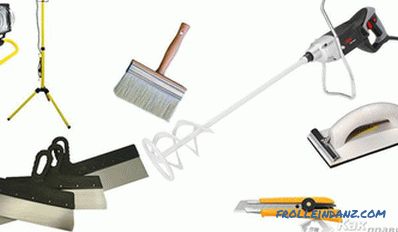 Tool
Tool
For the preparatory work to be carried out efficiently and successfully, it is important pick up all the necessary tools and follow the sequence of instructions provided by experienced professionals. This will require:
- metal spatulas, preferably several types and sizes;
- capacity for mixing the solution with high and straight sides;
- brush and roller for applying a primer mixtures;
- skins for final polishing of the ceiling surface.
Preparation
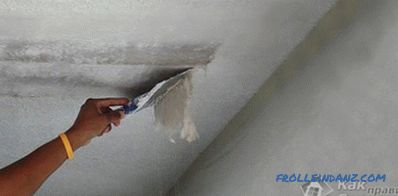 Remove old wallpaper
Remove old wallpaper
Preparatory work begins with the fact that the ceiling is completely cleaned from the previous layers of decoration, from old paint or plaster. This work should be done with the utmost care, since the durability of all subsequent alignment and ceiling coating processes depends on this. Old layers are usually cleaned with special spatulas or scrapers. Sometimes you can remove from a dry surface, if the old coating is well moving away. But professionals advise to pre-well wet the surface to be cleaned with water and thoroughly ventilate the room. This will contribute to a better separation of the old coating, as air bubbles will appear beneath it. After the surface is completely cleaned, it should be thoroughly cleaned.
The next step is to apply the primer. But before this it is important to determine how the ceiling will be leveling with your own hands, since the choice of primer mix depends on it. There are several types of it:
- for water-based paint,
- for plaster and putty,
- universal primer.
Plastering the ceiling
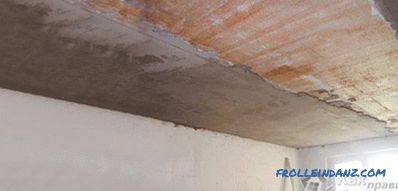 Plastering the ceiling
Plastering the ceiling
This finishing method is applied for leveling ceilings with very strong surface curvature. In this way, it is possible to level both concrete and steel, and wooden ceilings. Thanks to its functionality, this technique is the most popular. The layer of plaster should not exceed 5 cm, therefore the installed special beacons, respectively, can be no more than an acceptable size. After carrying out the leveling works with plaster, irregularities or splashes after complete drying can be cut off or sanded with a special construction float. Then a finishing topcoat is applied, which is carefully leveled.
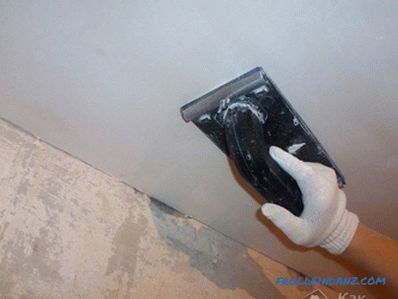 Making an ideally smooth surface
Making an ideally smooth surface
If the roughness does not exceed 5 cm, then dry plaster mixtures can be used . They are best used in small areas to perform local work, for example, repairing cracks and dents, since this material is quite expensive.
Ceiling putty
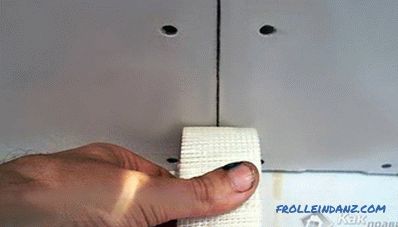 Treatment of drywall seams
Treatment of drywall seams
You can create a perfectly flat surface with a putty. This effect is achieved due to the fact that it is applied in a thin layer, and its structure is smaller than that of plaster. Before applying the putty surface thoroughly cleaned and skins. After that, a special mesh is attached to the glue. Today, there are many types of such nets, including the possibility of acquiring self-adhesive material.
Once the surfaces are fully prepared for the application of putty, you can mix the solution. To do this, it is diluted with water and thoroughly mixed using a construction mixer or a drill with a special nozzle.
As a result, the mixture should be similar in consistency to thick sour cream.
When the solution is ready, it should be quickly but gently applied to the prepared surface of the ceiling, as it soon begins to thicken. To do this, use a wide spatula, which with a small portion of the mixture is recruited. Apply a large spatula tightly to the ceiling, apply a layer of putty. If at the same time stains remain on the plane, do not worry and spend time aligning them, since after complete drying the ceiling is sanded with sandpaper, and all minor irregularities are completely eliminated. If all the used building material is from the same manufacturer, both the technical and aesthetic indicators of the work done will significantly improve.
This is how the finishing putty is put:
Execution steps
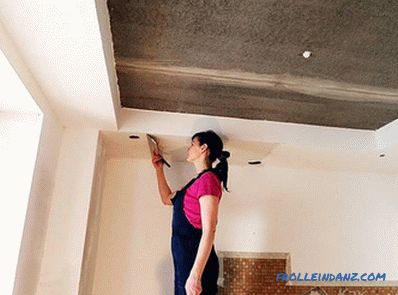 Drywall putty
Drywall putty
Since the application of putty is the main final step of leveling the ceiling, it is important to follow all the instructions of manufacturers and specialists. To summarize, the work is divided into several stages:
- preparation - cleaning the ceiling,
- coating with a primer deep penetrating mixture for better adhesion of materials,
- painting grid,
- the first starting layer of putty is no thicker than 1 cm,
- the finishing layer and polishing after the ceiling has dried.
It is important to remember that before further painting the plane it is necessary to once again treat the finished surface with a primer.
Photos
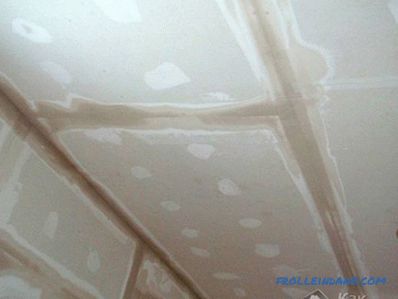 Plaster joints of the gypsum board ceiling
Plaster joints of the gypsum board ceiling
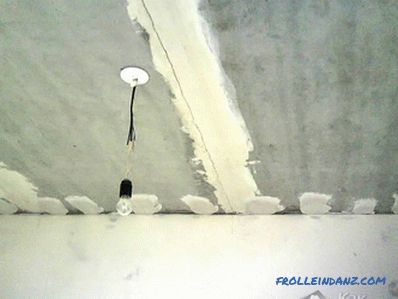 Fill the cracks with plaster
Fill the cracks with plaster
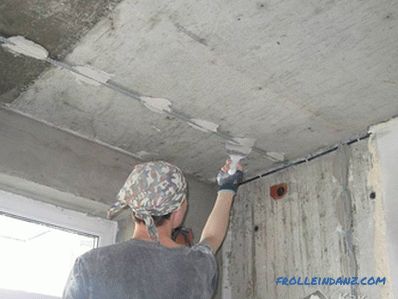 Install the beacons
Install the beacons
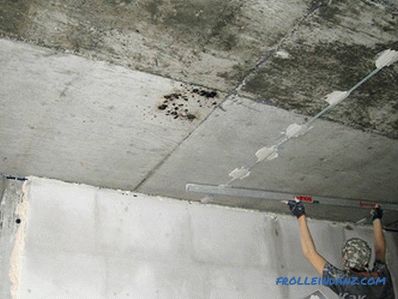 Plaster on beacons
Plaster on beacons
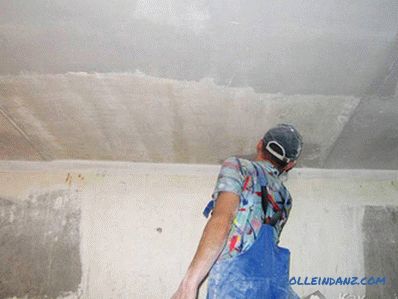 Mixing mixture
Mixing mixture
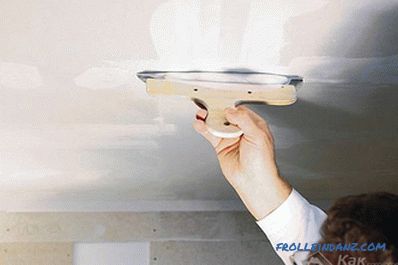 Finishing putty
Finishing putty
